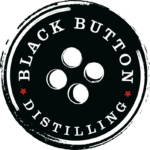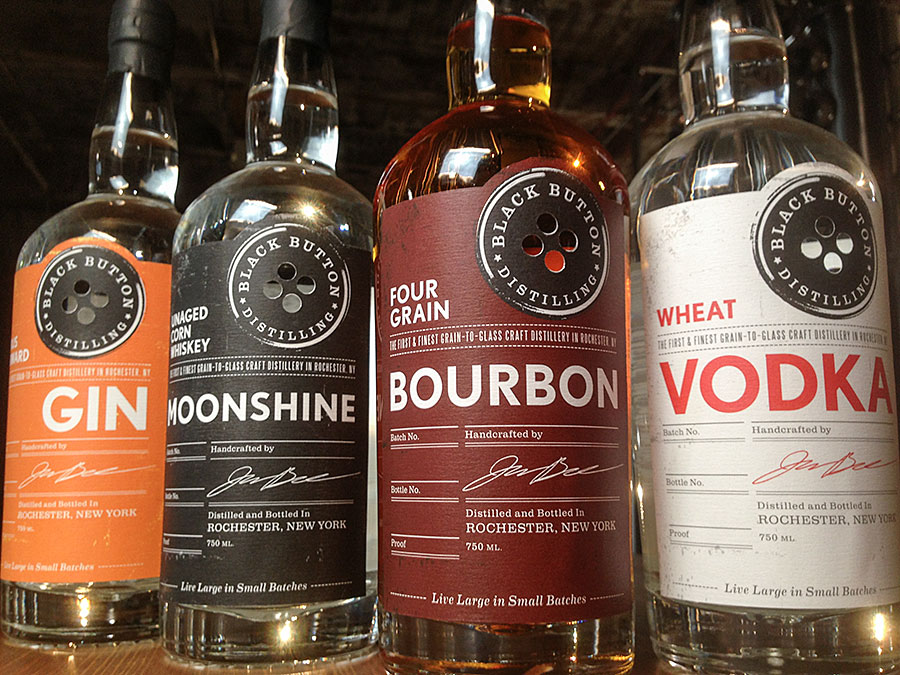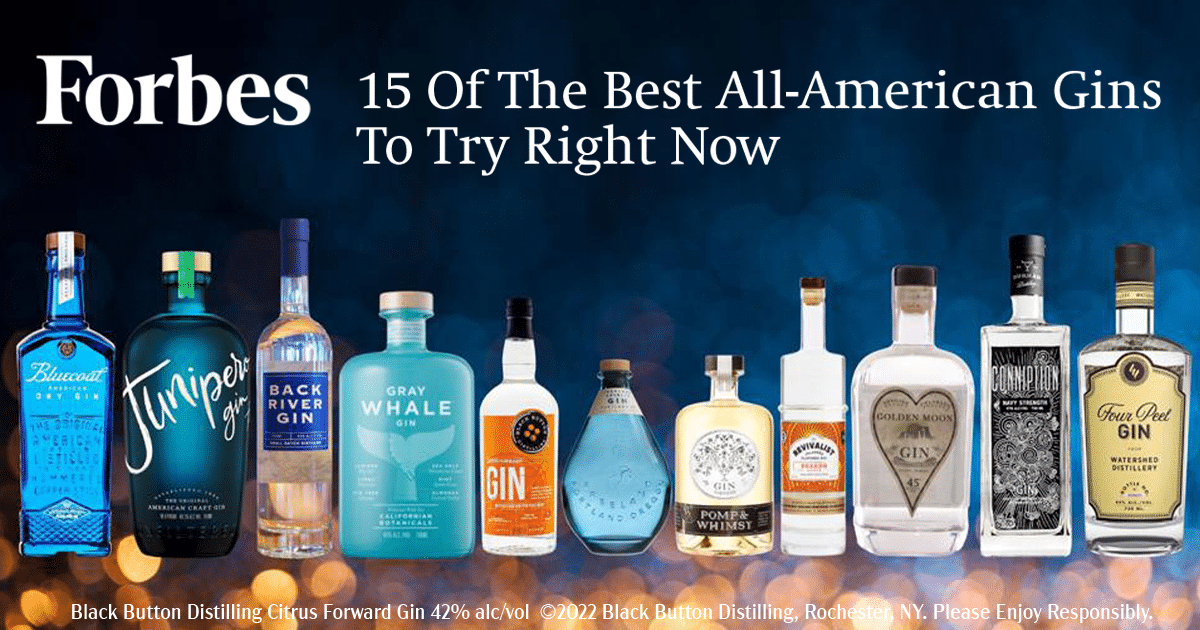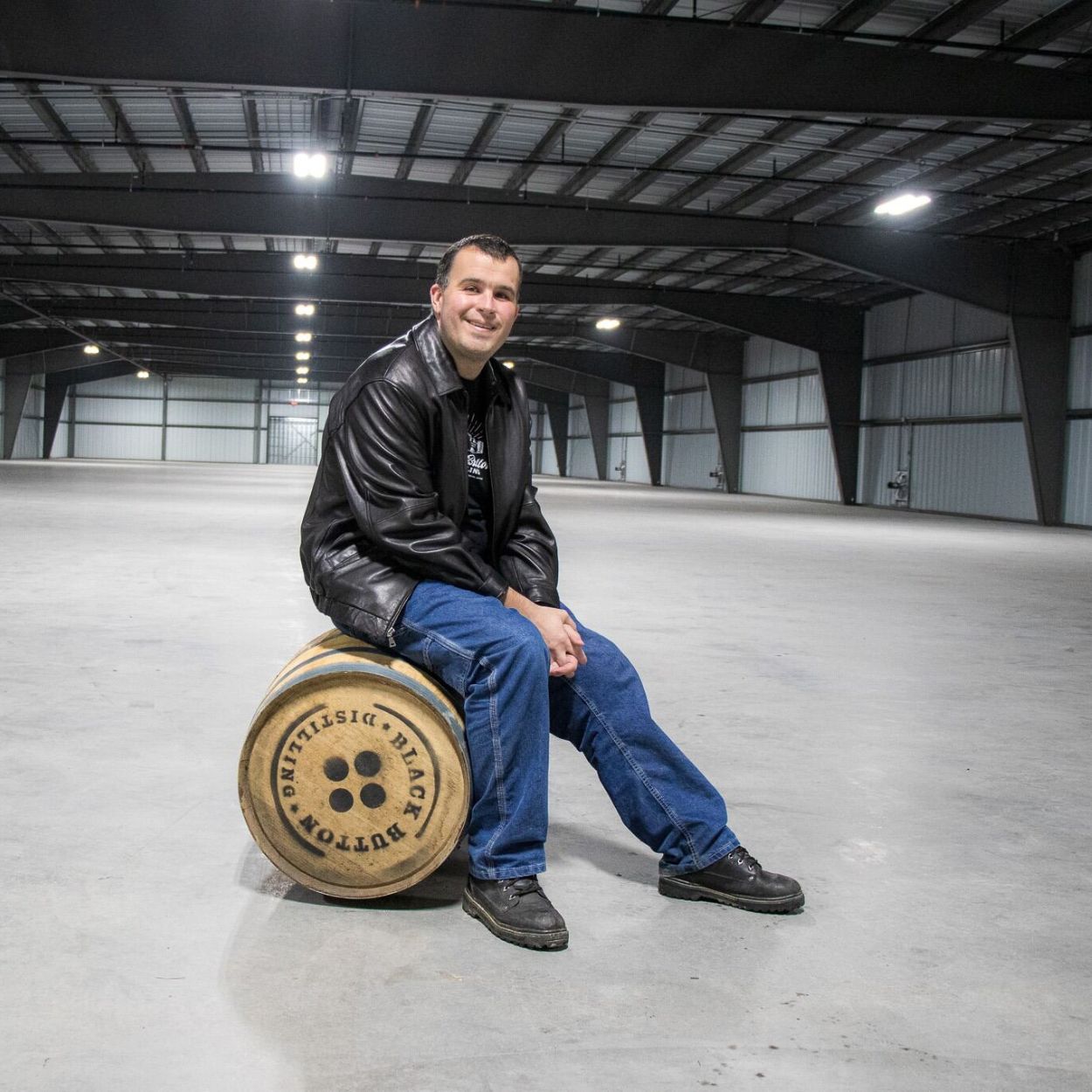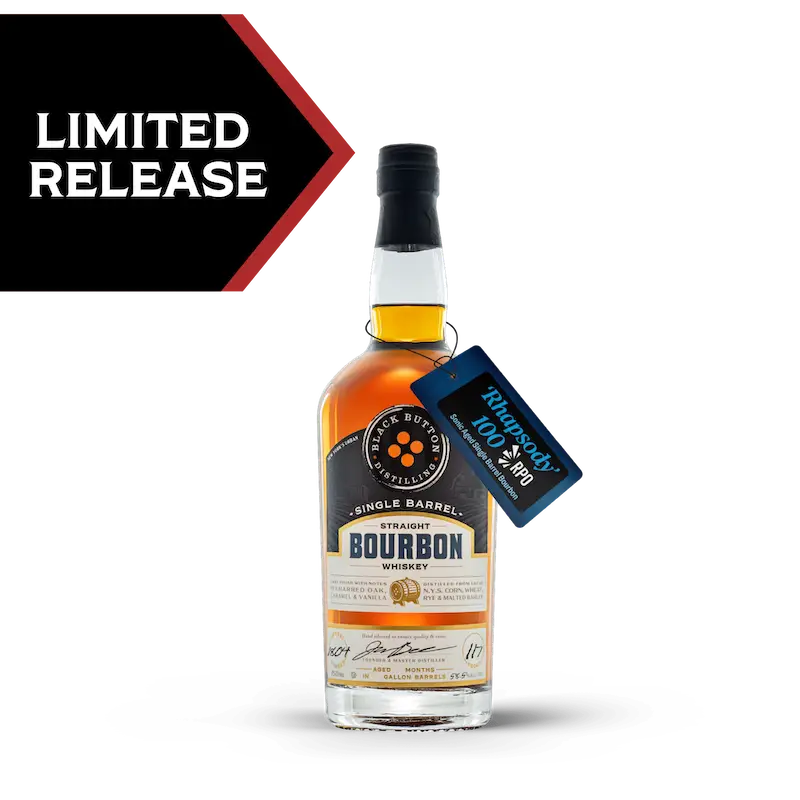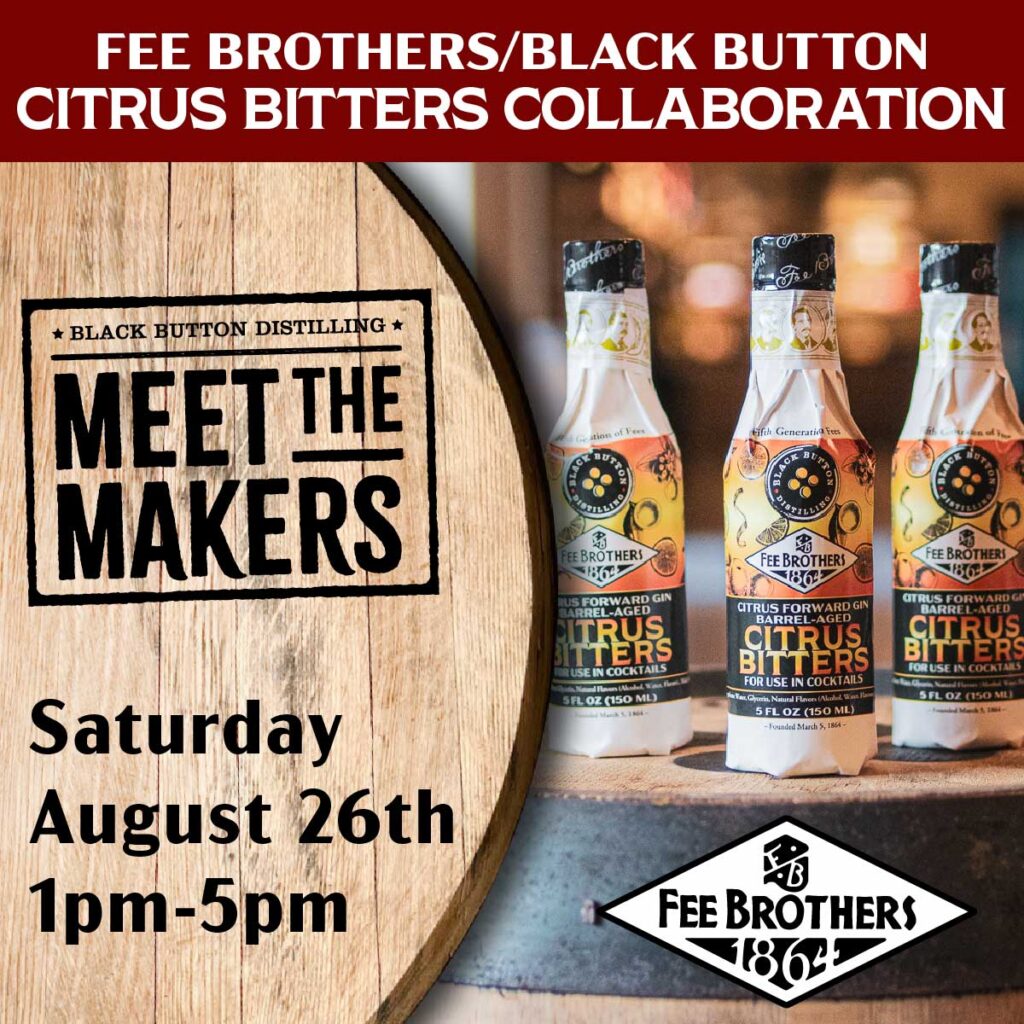ROCHESTER BUSINESS JOURNAL
By: Kerry Feltner KERRY FELTNER January 2, 2015
In just one year of operation, Black Button Distilling—Rochester’s first craft grain-to-glass distillery—is up 50 percent from annual revenue projections. It reached more than $600,000 in 2014 with the expectation to double its production in 2015.
The distillery produces roughly 1,350 bottles a week, and it plans to expand to 2,700 bottles a week by June. The firm makes one of its four products per week.
In its 5,000-square-foot space at 85 Railroad St., near the Rochester Public Market, the distillery has three full-time employees with roughly 13 part-time workers.
The company opened—with a single vodka offering—on Dec. 21, 2013. The next day it shut down to prepare a re-opening with citrus forward gin, moonshine and wheat vodka. It was re-launched Jan. 25 and released its Little Barrel Bourbon in November.
The company plans to begin distribution in Michigan on Jan. 1, 2015.
There are some 400 U.S. craft distillers as of mid-2013; last year, craft distilled spirits sales rose 30 percent, a survey by the American Distilling Institute shows. New York, Tennessee and Washington state each now produces more than 50,000 craft distilled spirits a year.
The firm’s owner comes from a long line of Rochester entrepreneurs.
Founded by 27-year-old Rochester native Jason Barrett, the firm’s moniker is a nod to Rochester’s past.
Barrett’s family has run a button company in the city since 1922. What was the Moses B. Shantz Button Co. on Monroe Avenue in the early 20th century was later re-organized as Shantz Associates Inc. Barrett’s great-grandfather was one of those associates.
His grandfather eventually bought out the other partners in the business in the late 1980s and his mother continues to run the Victor, Ontario County, company.
Barrett attended SUNY College at Cortland, graduating with a bachelor of arts in political science in 2008. While in college, his love of beer turned into a hobby of brewing beer with his college roommate.
“I was researching a paper on Prohibition and in that found that that although I couldn’t buy alcohol I could buy everything I needed to make it, which was sort of a funny loophole,” said Barrett, who is president and head distiller of Black Button, whose legal name is 24ligne LLC.
He moved to Washington, D.C., after school, working in the office of Rep. John McHugh, R-Watertown, who went on to become the secretary of the U.S. Army. Finding politics to be better in study rather than practice, he changed his focus. He secured a job at Paychex Inc. in Washington and continued to brew regularly.
“I sort of turned my kitchen into a miniature brewery, pumping out like 30 gallons of beer a month,” Barrett said.
“You have a fairly rapid progression of knowledge,” he added.
He accomplished his goal to visit every craft brewery within two hours of his home—all 12 of them.
He started his MBA at George Washington University in 2011, while working at Paychex.
“The very first day of my MBA program, they get all of the incoming MBAs into a big auditorium and they said, ‘Stand up if you want to start your own small business,’” Barrett said. “I was the only person that stood up in a hall of 350 people.”
While attending school and working 40 hours a week, Barrett began focusing on his real craft—brewing. He attended brewing classes in New York, Chicago, Michigan, Virginia and Washington State. The first class he attended in Virginia mentioned that the same process it took to brew beer was essentially the process of making bourbon.
“If I could take the same skills I know as brewing a beer, plus this knowledge of business I acquired from my MBA, plus New York State just passed a law that makes it OK to open a craft distillery, I could make bourbon instead of beer,” Barrett said. “It was a moment of realization.”
He earned his master’s distilling certificate from Dry Fly Distilling in Spokane, Wash., in 2013.
Along with the classes, Barrett gained hands-on experience from volunteering at DC Brau Brewing Co., the first packaged brewery in the nation’s capital.
The start
Barrett started thinking about the potential opportunities of moving back to New York.
Before leaving Virginia, in October 2012 he contracted pneumonia—a blessing in disguise that allowed him to complete his business plan, he said.
“The doctor said to me, ‘You either have to go home and stay in bed for three weeks or I’m going to have you committed to the hospital,’” Barrett said. “I’m stuck in bed but I was fairly clear-headed, and I took that time and I wrote the business plan.”
At 24 he dropped out of his MBA program and moved back to Rochester, working out of Paychex’s Rochester headquarters for six weeks before turning his full attention to his company.
“Basically, at some point in June I was toying with this idea, ‘Am I really going to quit this pretty good job I’ve got, not get another job, lose my house, sell my 401(k)?” Barrett said. “Am I really going to do this with my life? So, I just call up our family’s lawyer and I just start a company.”
The company’s first wheat vodka was not what the company was shooting for, Barrett said.
“It was different. There are a lot of people that thought that our first batch of vodka was pretty terrible, and I’m not even arguing with them,” Barrett said. “They’re all my babies so it’s hard to say I’ve got an ugly baby but it wasn’t right—I realize that. But what’s interesting to me is that what I didn’t realize was there’s a lot of people that won’t give us a second chance.
“The public has a very long memory. … We are slowly making up for that,” he added.
With 71 distilleries in the state, Barrett recognizes each has something different to offer.
“(We are) compatriots instead of competition because truthfully craft is such a small percentage of the overall buy,” Barrett said. “My competition is very well financed and very large and usually multinational corporations, but in some ways we’re like the little restaurant fighting McDonalds.”
Locally Black Button Distilling’s spirits have a following already.
“We’ve been doing business with them since the very beginning,” said Matthew Yaeger, manager of Pinnacle Discount Wine & Liquor on Monroe Avenue in Brighton. “They did a great job as far as promoting before the stuff actually hit the streets for us that always makes a big difference just because there’s demand already built up for it. We actually tried everything before it was released and we liked it, so it was kind of an easy decision.”
The company won a silver medal at the 50 Best Gin Competition in New York City, was deemed the Best Alcoholic Beverage at Foodlink Inc.’s Festival Food event and received a 93-point review from the liquor review website Just One Dram.
Barrett’s expertise shows in his products, Yaeger said.
“I think they do a good job of seeing what the market wants,” he said. “Jason, he’s a pretty avid whiskey drinker himself, so I think he’s always trying to be on top of the latest trends. With bourbon especially he really keeps an eye on what’s popular in the market.”
Market for spirits
Spirits are often just a bandwagon commodity, but Barrett is in it for the right reasons, Yaeger said.
“I think when people see spirits getting hot as a category they try and jump on board and we’ve seen it with a lot of vodkas out there,” he said. “There’s a plethora of clear spirits that were presented every day, but really when you taste them and you look at the cost it doesn’t make sense. Jason puts out something that he invests not only his time and money in but he really cares about it so it’s kind of refreshing.”
Black Button’s spirits are distributed to a variety of local liquor stores and restaurants.
“I think it’s a great place to have it because Rochester’s also an incredibly food-smart town,” Barrett said. “We’ve got a long-standing history of breweries, you’ve got Constellation Brands, (and) you’ve got all the wineries down in the Finger Lakes.”
The immediate concerns are growth, physical expansion and finding barrels, Barrett said.
“The biggest challenge is in signing up new accounts. People are wary of trying new products, but we signed up 200 accounts. We have not lost a single one. It’s been an incredibly positive response,” he said.
Shifting from beer to spirits was a welcome challenge for Barrett.
“I think distilleries will always be smaller than wineries and breweries,” Barrett said. “There’s such romanticism with wine, and then beer is a lot farther ahead than we are, and both of these are things that you can try at home and then get into professionally. The barrier to entry for distilling is pretty high.
“I don’t know that it’s any harder—it’s just more mysterious. It’s not as straightforward. It’s just different.”

